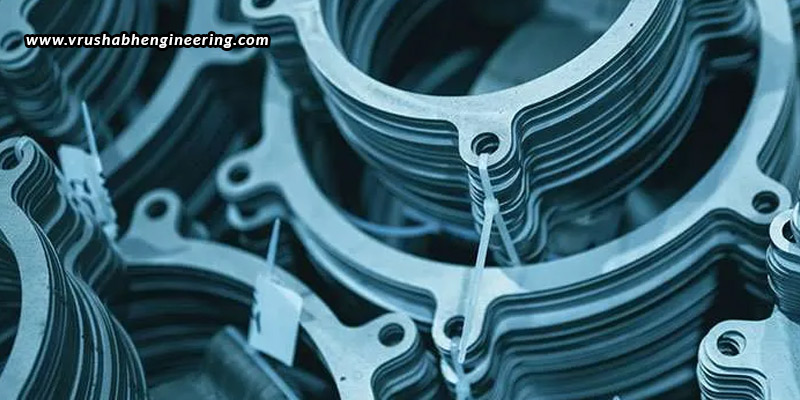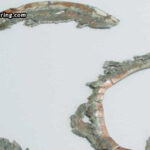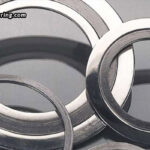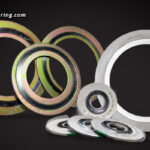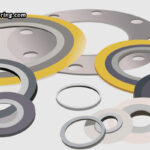Gaskets may appear to be plain, simple components, but they are just as crucial for ensuring the efficiency, safety, and dependability of industrial machinery and systems. These important sealing elements are responsible for preventing leaks, maintaining pressure, and safeguarding against contamination. While the choice of gasket material is significant, the design often plays a pivotal role in determining performance in practical applications. A well-engineered gasket can improve sealing effectiveness, endure extreme temperatures, handle high pressures, and resist chemical interactions, thereby allowing machines to function optimally with reduced maintenance needs. This discussion will delve into how gasket design affects machine performance, emphasizing critical aspects such as sealing effectiveness, thermal resistance, pressure capacity, and chemical compatibility.
Sealing strength
A high-pressure steam line in a chemical facility operates efficiently – until a minor gasket leak results in a pressure drop, bringing operations to a standstill. The root of the problem lies in the compromised sealing integrity. A gasket must adapt to the surfaces it seals and sustain consistent pressure without excessive compression, which can cause deformation or material fatigue, ultimately leading to failure.
- Compression and contact pressure
To ensure a dependable seal, a gasket must generate sufficient contact pressure between flange surfaces. Soft gaskets, such as those made from rubber or compressed fibre, are effective in low-pressure scenarios where flexibility is essential. Conversely, metallic gaskets, including stainless steel and Inconel, offer the necessary strength and rigidity for high-pressure settings.
- Surface contact and flange finish
The state of the flange surfaces significantly affects sealing performance. Smooth flanges necessitate softer gaskets to accommodate slight imperfections, while rough or uneven surfaces require more robust gaskets with high compressive strength to avert leaks. Spiral-wound gaskets, which combine metal with soft fillers, excel in challenging flange conditions.
- Load distribution and bolt tension
Inconsistent bolt tension during installation frequently results in gasket failure. When one side of the gasket experiences greater pressure, weak points can form, heightening the risk of leaks. Spiral-wound and ring-type joint (RTJ) gaskets are designed to distribute load evenly, ensuring resilience under varying conditions.
Thermal resistance
Temperature variations can significantly impact gaskets, leading to issues such as expansion, contraction, hardening, or cracking. A gasket engineered for thermal stability guarantees that machinery functions efficiently, even in challenging conditions.
- Material selection based on temperature resistance
Graphite and PTFE gaskets maintain their shape and flexibility in extreme heat, making them well-suited for high-temperature applications. Graphite gaskets can endure temperatures exceeding 500°C without compromising their structural integrity. Silicone gaskets are effective in both high and low temperature ranges, making them ideal for environments that experience rapid thermal changes.
- Thermal cycling and expansion
Regular cycles of heating and cooling result in thermal cycling, which can cause stress fractures in gaskets or diminish their sealing capabilities. Spiral-wound and metal-jacketed gaskets are designed to withstand this stress, preserving their sealing function even after numerous cycles of expansion and contraction.
- Heat-induced hardening and softening
Rubber-based gaskets may harden or soften over time due to prolonged heat exposure, which can impair their sealing effectiveness. Choosing materials with excellent thermal stability is essential for ensuring durability and preventing degradation in high-temperature settings.
Pressure tolerance
Pressure is a vital element that affects the performance of gaskets. In systems operating under high pressure, gaskets must endure significant mechanical forces without deforming or compromising their sealing capabilities.
- Managing high-pressure conditions
Metallic gaskets, such as those made from stainless steel or Inconel, are designed to handle extreme pressures found in oil refineries, chemical processing facilities, and hydraulic systems. Conversely, softer materials like rubber, PTFE, and fibre-based gaskets are more appropriate for low-pressure applications. Gaskets reinforced with metal cores or constructed in a spiral-wound manner offer reliable sealing in high-pressure situations, effectively preventing leaks and ensuring the dependability of the system.
- Preventing blowouts
A gasket blowout occurs when the internal pressure exceeds the gasket’s strength, leading to rupture or displacement. Ring-type joint (RTJ) gaskets create robust metal-to-metal seals, making them particularly effective in high-pressure settings where maintaining structural integrity is essential.
- Creep and compression set
Over time, certain gasket materials may undergo creep or compression set, resulting in a diminished ability to revert to their original shape after being compressed. This deterioration can compromise the seal and result in leaks. Gaskets made from PTFE and Viton are resistant to creep, thereby ensuring sustained performance in high-pressure environments.
Chemical compatibility
In chemical processing facilities, gaskets encounter corrosive substances that may lead to swelling, hardening, or breakdown. Selecting the appropriate gasket material is crucial for ensuring both durability and longevity.
- Resistance to corrosive substances
PTFE (Teflon) is inert to strong acids, bases, and solvents, while Viton is resistant to oils, fuels, and hydrocarbons, making it suitable for automotive and industrial applications. Graphite gaskets provide outstanding chemical resistance, even at elevated temperatures, ensuring reliability in harsh chemical environments.
- Environmental factors
Gaskets used in outdoor settings are subjected to UV radiation, moisture, and varying weather conditions. Silicone and EPDM gaskets are designed to withstand weather-related deterioration, preserving their sealing capabilities even after extended exposure to sunlight and rain, making them well-suited for external applications.
- Preventing swelling and deterioration
Certain gaskets can absorb liquids, resulting in swelling and a compromised seal. PTFE and Viton gaskets are resistant to fluid absorption, ensuring a stable and reliable seal even in chemically aggressive conditions, thereby minimizing the risk of deterioration and failure.
Optimizing gasket design for maximum machine performance
An appropriate gasket design significantly improves machine efficiency, minimizes downtime, and helps avoid expensive failures. Flat gaskets are suitable for low-pressure scenarios, whereas spiral-wound gaskets are designed to endure high temperatures and pressures. For environments with extreme pressure, ring-type joint (RTJ) gaskets are the preferred choice. It is essential for gaskets to possess sufficient thickness to create a seal without deforming under pressure, and custom designs can enhance performance for specific machinery. Correct installation is vital, as improper placement can result in failure, even with a well-engineered gasket. Regular inspections and timely replacements are necessary to ensure system reliability, providing a durable and effective sealing solution for a range of industrial applications.
Vrushabh Engineering – Your trusted industrial gaskets manufacturer in India
As one of the top gasket manufacturers in India, Vrushabh Engineering offers expert advice and high-performance gasket solutions customized for various sectors. Their innovative designs are built to withstand demanding conditions, delivering enduring sealing strength and durability. Partner with Vrushabh Engineering for tailored gasket solutions that boost machine efficiency and lower maintenance needs. For dependable gasket solutions that ensure your machinery operates at optimal performance, rely on Vrushabh Engineering!

